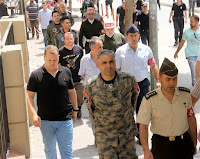 Yesterday, more than two weeks after Turkey's failed coup, Turkish troops and demonstrators again surrounded the joint NATO base at İncirlik. After the July 15 coup attempt, Turkey had surrounded the base and cut power. After nearly a week since the coup with external power cut off, the US confirmed that power had been restored to the base on July 22. The power had been cut at the time of the coup, after at least one Turkish KC-135 was used to refuel Air Force aircraft used to attack
Ankara. The Turkish commander at İncirlik was arrested (photo at left).
Yesterday, more than two weeks after Turkey's failed coup, Turkish troops and demonstrators again surrounded the joint NATO base at İncirlik. After the July 15 coup attempt, Turkey had surrounded the base and cut power. After nearly a week since the coup with external power cut off, the US confirmed that power had been restored to the base on July 22. The power had been cut at the time of the coup, after at least one Turkish KC-135 was used to refuel Air Force aircraft used to attack
Ankara. The Turkish commander at İncirlik was arrested (photo at left).As the purges (no other word quite works) have deepened, Turkish rancor towards the United States has deepened, as demands for extradition of Fethullah Gülen and vague accusations of US responsibility for the coup have accelerated, and President Erdoğan has been saying NATO and the US are not Turkey's friends. But İncirlik is a NATO base, and is home to a store of nuclear weapons, the only US nukes permanently deployed in the Middle East. The weapons are part of a nuclear sharing program under which NATO deployed weapons in allied countries, under full US control in peacetime, but which would be available to the allied power in a nuclear war. of some 200 weapons still stored with NATO allies in Europe, the largest number, estimated somewhere between 50 and 90, are at İncirlik.
The weapons are stored in storage bunkers under the control of the US Air Force and are equipped with Permissive Action Links (PALs), which prevent their use without express authorization by US National Command Authority. How secure are the PALs in an age of cyberhacking of secure computer networks? The US Air force assures that they are foolproof, but if a hostile power came into possession of the weapons, some observers are not sure how unbreakable the codes may be?
When the Turkish Army sealed off the base and cut off electrical power, USAF raised the Force Protection Condition to FPCON Delta, the highest possible. But with continuing threatening gestures from Turkey, like yesterday's on the eve of a visit by the Chairman of the Joint Chiefs of Staff, Marine General Joseph Dunford, a certain jitters about the security of the nuclear arsenal seems appropriate.
The weapons are B61 thermonuclear gravity bombs with a variable adjustable yield with an upper limit of an estimated 340 kilotons, two to three times the yield of the Hiroshima or Nagasaki bombs, which means they are now classed as tactical rather than strategic weapons, though it has long been assumed that the use of tactical nukes would inevitably escalate to the use of multi-megaton strategic weapons.
The B61s are aging and only tactical, but they could still destroy a city. The number at İncirlik is estimated at 50 to 90, increasingly outdated or even obsolete. That's between 50 and 90 goddamn fucking H-bombs.
If Turkey were to leave NATO the US would presumably withdraw these weapons, but what if the coup had succeeded and a hostile force gained control of the weapons. Or if Erdoğan quit NATO and seized the base? How confident are we the PALs cannot be compromised. Many voices are warning the nukes are in some jeopardy, They are unlikely to be used for their original purpose, to defend Turkey. Is it time to get them out?
Bear in mind where İncirlik is located. It is just outside Adana in southeastern Turkey.
The larger map below emphasizes the importance of this. The base is perhaps 100 miles from the Syrian border, In the map below, Adana is the conurbation in southeastern Turkey at the upper left; the city in the lower right is Aleppo. Of all the places in Turkey to store nuclear weapons, we store ours as close to the ISIS front lines as possible. I suspect the US is having second thoughts about this deployment.





1 comment:
Time to bring the babies home before they become orphans.
Post a Comment